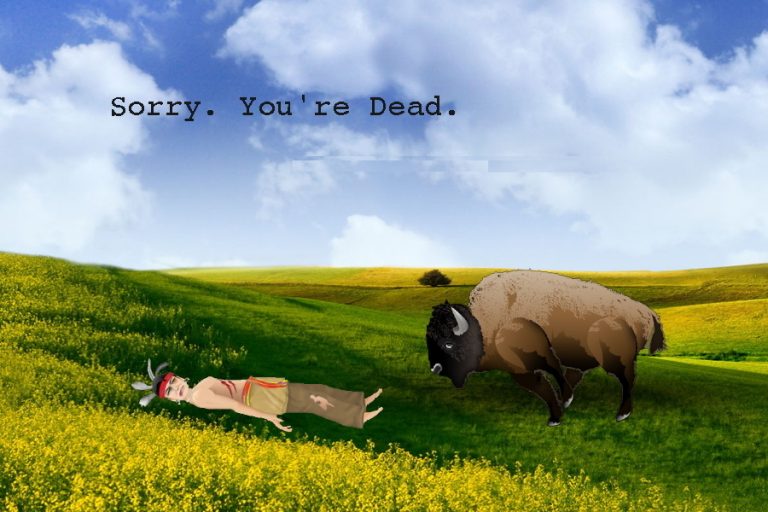This post seems like it’s about judo, but it’s actually about life.
I told my friend, Serge, that I didn’t understand why people in judo would keep losing in the same way. For example, there was a young woman who won a lot of national competitions. I watched her a few times and told my daughter, “She only attempts a throw when she has a grip with her left hand behind her opponent’s collar. When you fight her, your whole purpose in life is keeping her from getting that grip.” Of course, Ronda beat her in exactly that way – and then the young woman went on beating everyone else just the way she had with that grip. No one else noticed and she did not realize that is why she lost.
I gave Serge several similar examples and said,
I just don’t get it ! How can I see these patterns over and over, yet, all these other coaches and their athletes miss what is right in front of them?
– Me
Serge answered,
You’re missing the fact that most of those people are stupid.

While this did give us both a good laugh, the truth is that some of those people who missed what I consider obvious openings are actually really smart. (Of course, others would lose a contest of problem-solving skills to your average rock.)
Serge went on to argue that many coaches, and athletes, hone in on a certain set of skills, and if they have some success, they polish those same techniques and just repeat them over and over.
Which brings us to software
Wait, what? No, seriously. The same mistakes get made in designing and developing software. Let’s take educational games for an example, because I have made a lot of these and seen a lot that were not very effective.
Someone makes a game that shows 8 x 6 on a screen. The player shoots the number 48 with a ray gun. Now another number appears. You can find hundreds, maybe thousands, of games like that. I call them “shooting and” games. Shooting and multiplication. Shooting and division. Shoot the misspelled word.
Games like that aren’t hard to make. They can look very colorful. Shiny. People download a lot of them. We’ve had computers in schools for at least 35 years and there are now 307,000,000 ‘smart phone’ users in the United States. Have you noticed math scores skyrocketing and massive improvements in writing ability? I am willing to bet that you have not.

When I make games these days, I’m focused on issues that might concern students, like climate change, and include math problems in context of flood, fire and declines in the salmon catch.
Also, math education
When students learn mathematics, they do worksheets of 60 problems of the same type. The problems are all the same type, say, converting fractions to decimals, because “We don’t want to confuse them.”
The reason that is not a good idea, even if everyone is doing it, is that life confuses us. In real life, math problems are not always presented with an obvious label of “Subtract the prior year sales from the current year sales and then divide by the prior year sales.”
You have to figure it out. This is precisely why so many people have difficulty with word problems. They need to figure out WHAT KIND of math problem it is they need to solve, and doing a worksheet of 60 of the same type of problem doesn’t help you with that.
Doing the same thing over and over doesn’t help with new problems
In the book, Range, David Epstein argues that people who have experience in a variety of fields often come up with better solutions than those who specialize from an early age, even if they put in those magic “10,000 hours” of practice. In a way, having experience in multiple fields lets you look at issues from a different perspective.
In judo, many of my competitors came from well-known clubs with high-ranking instructors who had been successful competitors themselves. Personally, I started at the local YMCA and just went anywhere in the area they had a mat. At home, our garage was too broken down to be safe to park a car. There were boards hanging down from the roof and it leaked in any rainstorm, so we just threw old junk in there. I spent a lot of time with my older brother, throwing each other on an old musty mattress. We’d look at judo books and try any technique that looked fun.
When my competitors went home from a tournament, their high-ranking instructor would have them practice 1,000 times uchi mata, or whatever throw they were doing, making minor corrections in their foot placement, improvements in speed.
As often as not, after a tournament, I would hitchhike to Kansas City and train with my friend, Becky Scott, in the basement of the community center. Our practices were a lot of, “Hey, Beck, what would you do if I cranked on your head like this?”
My point, and I do have one
If you’re not getting where you want to be in life, ask yourself whether you are working on getting better and better at doing things the same old way. Perhaps you’d be more successful in the long-run by doing something new. Let me just warn you, as you’d learn if you read the book I just mentioned, in the short-term, you’ll probably do worse. Set yourself a timeline – six months, five years – whatever makes sense for your goal – and give something new a shot.
When I make this recommendation, people often ask me, “But Dr. De Mars, what if my new venture doesn’t work out?”
As I told my lovely daughter, Julia this afternoon, “If that doesn’t work out, then try something else. You’re not forced to keep doing it. We got rid of slavery and indentured servitude in this country 150 years ago.”






